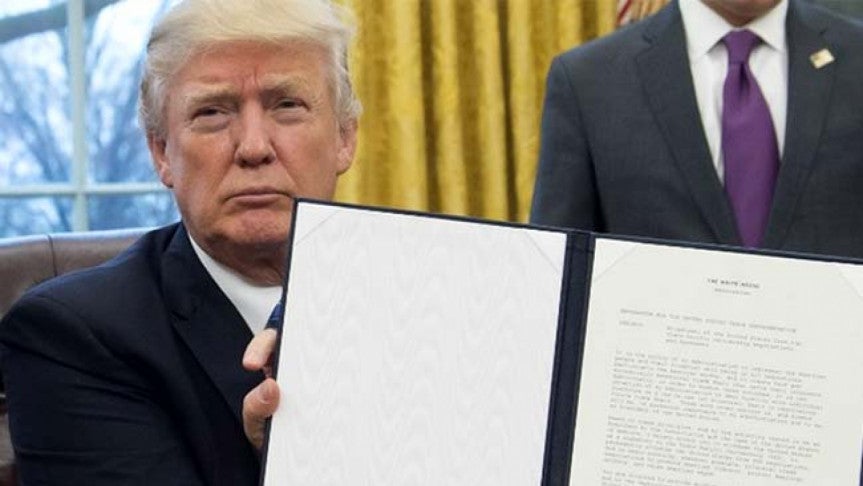Muslims barred from flights to US, as others detained

Tehran, Iran: Iranians and Iraqis planning to fly to the United States were prevented from boarding on Saturday after US President Donald Trump's order to restrict arrivals from seven Muslim countries.
Iran slammed the "insulting" ban and said it would reciprocate.
On Friday Trump signed a sweeping executive order to suspend the arrival of refugees and impose tough new controls on travellers from Iran, Iraq, Libya, Somalia, Syria and Yemen.
His move sparked widespread international criticism.
Travellers from the Middle East were stopped from boarding US-bound planes.
Some who were already in the air when Trump signed the executive order were detained on arrival, the New York Times reported.
In Tehran, two travel agencies told AFP they had been instructed by Etihad Airways, Emirates and Turkish Airlines not to sell US tickets or allow Iranians holding American visas to board US-bound flights.
An Iranian studying in California said she could not now return because her ticket had been cancelled under the new restrictions.
"I had a ticket for Turkish Airlines on February 4, but it has been cancelled," the girl, who did not wish to be identified, told AFP in Tehran.
Iranian President Hassan Rouhani did not comment directly on the ban Saturday, but criticised Trump, saying that now was "not the time to build walls between nations".
Iran's foreign ministry said it would "respond in kind after the insulting decision of the United States concerning Iranian nationals" until the measure is lifted.
It said the decision was "illegal, illogical and contrary to international rules".
More than a million Iranians live in the United States.
- Legal challenge -
In Khartoum, the Sudanese foreign ministry expressed its "regret" at the US ban.
On Saturday in Egypt, a country not included in the new restrictions, an Iraqi couple and their two children were told they could not board an EgyptAir flight from Cairo to New York.
Airport officials said the four Iraqis all had American visas.
The New York Times reported that two Iraqi refugees were detained on arriving at New York's John F. Kennedy airport hours after Trump signed the order.
On Saturday, the American Civil Liberties Union and other advocacy groups filed a legal challenge to Trump's order.
Lawyers representing the Iraqi pair also filed a court appeal for their release, saying they were being unlawfully detained.
The United Nations responded by urging Trump to continue his country's "long tradition" of welcoming refugees and to ensure their equal treatment, regardless of race, nationality or religion.
French President Francois Hollande said Europe must have a "firm response" to Trump, and "when he refuses the arrival of refugees, while Europe has done its duty, we have to respond".
Hollande was due to speak with Trump later Saturday.
In Lebanon, Syrian refugees struggling to get by in makeshift camps bemoaned their fate.
"What on earth have the Syrian people done to deserve this?" asked Abu Mahmoud al-Ghol, at one informal camp in the Marj area.
"And to think it's a democratic country doing it," the 44-year-old said.
- Refugees barred -
Nearly six years of conflict in Syria have driven more than half the population from their homes, with many fleeing abroad and dreaming of new lives in the West.
Trump's executive order specifically says no visas will be issued for 90 days to migrants or visitors from the seven Muslim-majority countries.
It also bars Syrian refugees from the United States indefinitely, or until Trump himself decides that they no longer pose a threat.
His decree suspends the entire US refugee resettlement programme for at least 120 days while tough new vetting rules are established.
Qatar Airways, which flies to around 15 American cities, said it would abide by the new regulations, adding however that passengers who have "the proper documentation" will be able to fly.
An alert on its website said citizens of the seven barred countries could travel to the US if they have permanent residency there.
Government officials and their immediate family are exempt from the travel restrictions along with representatives of international organisations, the Gulf carrier said.
Trump's move has also angered one of Iran's most popular actresses, Taraneh Alidoosti who stars in the Oscar-nominated "The Salesman".
She said she would boycott next month's Academy Awards ceremony in Los Angeles.
"Trump's visa ban for Iranians is racist," she tweeted. "Whether this will include a cultural event or not, I won't attend the #AcademyAwards 2017."

 AFP
AFP



